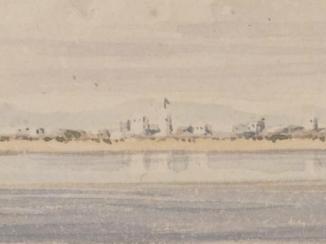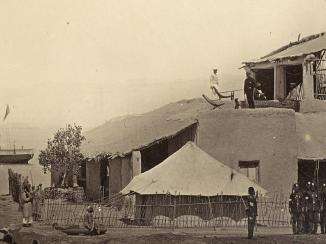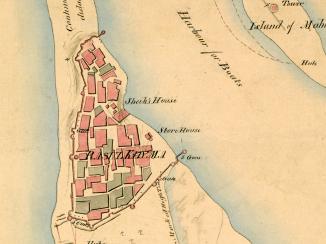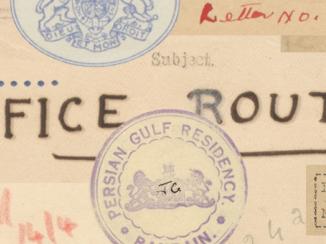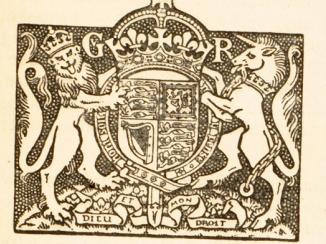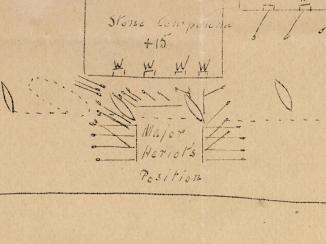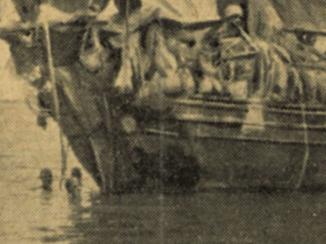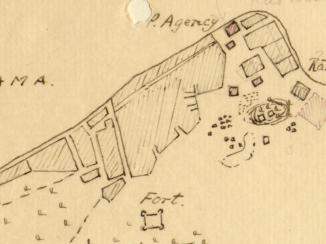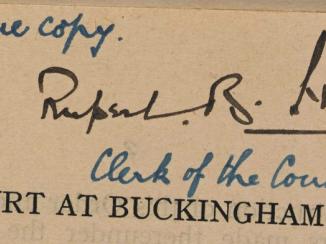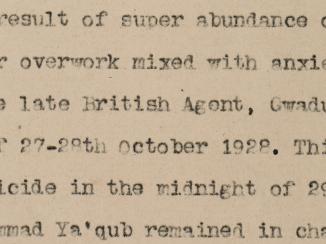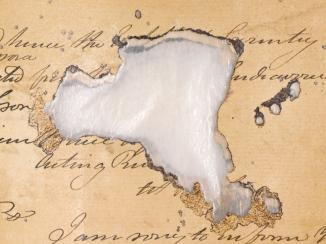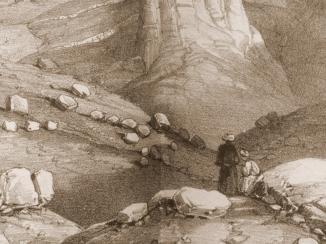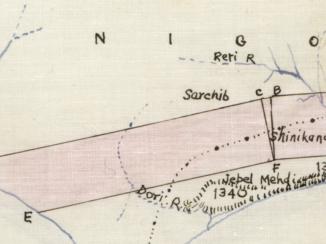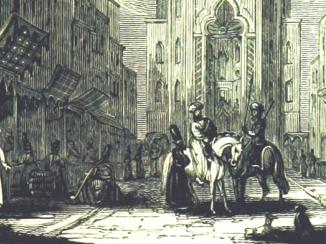Overview
The senior level of Britain’s Political Agency An office of the East India Company and, later, of the British Raj, headed by an agent. , Bahrain, which existed between 1900 and 1971, was run by British officials drawn from the Political Service of the Government of India. They in turn relied on a body of clerks and interpreters, many of them British Indian subjects, who carried out the bulk of the routine administrative work. The Agency An office of the East India Company and, later, of the British Raj, headed by an agent. relied on a staff of menial workers, at a lower level again, who were drawn mainly from Bahrain and neighbouring Gulf states.
Records of the Menial Establishment
The ‘Menial Establishment’ included ferashes (menial and domestic workers); sweepers; gardeners; Agency An office of the East India Company and, later, of the British Raj, headed by an agent. Launch crew, including nakhudas (boat masters) and khalasis Used by the British officials to refer to a non-European labourer, especially one employed on a ship. (seamen); hospital staff, and Agency An office of the East India Company and, later, of the British Raj, headed by an agent. chauffeurs. The majority of these were local Bahrainis. The ‘Establishment Files’ of the Bahrain Political Agency An office of the East India Company and, later, of the British Raj, headed by an agent. in the India Office The department of the British Government to which the Government of India reported between 1858 and 1947. The successor to the Court of Directors. Records contain many letters from members of staff in these classes, particularly from the 1940s, which provide an insight into the lives of ordinary people in a society that was beginning to undergo radical change. Common subjects were requests for pay rises, requests for leave (including leave to go on pilgrimage) and requests for advances of pay. The letters were often signed by the correspondents using an imprint of the individual’s left thumb, sometimes with a signature overwritten in Arabic.
![Letter from Ahmed Jasim, Agency Head ferash to the Political Agent, Bahrain, dated 21 Dhul-Hijjah 1364 [27 November 1945] requesting an increase in his allowance for making coffee. IOR/R/15/2/977, f. 8](https://iiif.qdl.qa/iiif/images/81055/vdc_100000000241.0x0001e0/IOR_R_15_2_977_0018.jp2/full/,600/0/default.jpg)
Petitions for Pay Increases
In 1945, the head ferash reported that the new Political Agent A mid-ranking political representative (equivalent to a Consul) from the diplomatic corps of the Government of India or one of its subordinate provincial governments, in charge of a Political Agency. , Lieutenant Colonel Galloway, had ordered the coffee to be made stronger: he therefore requested a pay increase of ten rupees Indian silver coin also widely used in the Persian Gulf. per month to meet the cost of ‘coffee, cardamoms, ‘Awood, rose water, charcoal, kerosene oil, etc’, implying that the cost of these purchases came out of his wages. In the same year, the pay of the Political Agent’s driver was increased from eighty-five to ninety-five rupees Indian silver coin also widely used in the Persian Gulf. per month, and the sum of five rupees Indian silver coin also widely used in the Persian Gulf. per month was added to the pay of one of the ferashes ‘for looking after the office cycles’.
In 1947, the Agency’s nakhuda and two khalasis Used by the British officials to refer to a non-European labourer, especially one employed on a ship. joined together to submit a petition requesting that the Assistant Political Agent A mid-ranking political representative (equivalent to a Consul) from the diplomatic corps of the Government of India or one of its subordinate provincial governments, in charge of a Political Agency. reconsider their wages and grant them an increase in pay, as ‘our salaries are very little when compared with the dearness in living expenses and our daily needs’. This resulted in a pay rise of five rupees Indian silver coin also widely used in the Persian Gulf. per month.
In the same year, the Agency’s dhobi (washerman) also complained that ‘I am at present washing uniforms and car covers etc. of the office car and the truck for which I do not get any remuneration at all. Cost of soap, coal, soda etc. are still at the same high level. Cost of living in Bahrain has also not gone down to any extent’. He therefore requested a pay rise of twenty rupees Indian silver coin also widely used in the Persian Gulf. per month.
In another example, in 1946 a letter was received from someone who claimed to be the oldest ferash in the Agency An office of the East India Company and, later, of the British Raj, headed by an agent. . It stated ‘I beg to submit that I am an Indian serving in a foreign country, am fifty-one years old and rendered twenty years service [sic]’; he therefore asked for an increase in pay in line with the younger men. Also in 1946, one of the launch crew requested a pay rise after working in the Agency’s launch ‘day and night’ for three months: an increase that would be a ‘comfort to me and my family at Muscat’.

The Gradual Improvement of Wages
By the late 1940s, the Agency’s menial staff were in a strengthening position in terms of pay bargaining. An Agency An office of the East India Company and, later, of the British Raj, headed by an agent. memorandum of October 1947 noted that the Bahrain Petroleum Company (BAPCO) had recently increased the wages paid to their Arab labourers in light of significant postwar increases in the price of essential foodstuffs. Early sanction was therefore requested to increase Agency An office of the East India Company and, later, of the British Raj, headed by an agent. staff’s pay by ten rupees Indian silver coin also widely used in the Persian Gulf. per month ‘to dissuade the menial staff from leaving in search of more profitable employment’.
Nevertheless, improvements in Bahrain workers’ standards of living were only taking place very gradually. In 1948, the Political Agent’s driver asked the State Medical Officer for permission to bore a water-well in his house, stating ‘I am a man of little income so that I am not in a position to afford to keep on buying water. I, however, assure you that I will comply with the rules and regulations governing observation of health and hygiene’. The Agent himself supported the application stating, ‘I should be grateful if you would allow my driver to bore a water-well in his house for washing purposes. He cannot afford to keep on buying water and is four-hundred yards away from the public water well. It is, I am afraid, of no use to people like him to ask them to wait until the water scheme comes into operation. One might as well ask them to wait until we have an adequate electric supply in Manamah’.

The records demonstrate the way in which the British Agency An office of the East India Company and, later, of the British Raj, headed by an agent. in Bahrain was dependent for its efficient functioning, and the comforts of its senior officials, on a large number of people performing ordinary, manual tasks. While the Agency An office of the East India Company and, later, of the British Raj, headed by an agent. was a welcome source of employment (the files show that there was no lack of applicants for such work), the pay was clearly low, and conditions were exacerbated by the effect of wartime shortages. What really made a difference to the claims of these workers for higher pay was increased competition for their services in the wake of the oil boom after 1945.

